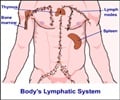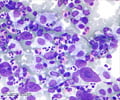Hodgkin lymphoma is a type of cancer which originates from a specific type of white blood cells called lymphocytes and limits the body to fight infection.

‘Increased fat deposits consistent with obesity were found among the patients who experienced relapse of Hodgkin Lymphoma.’





Reduced muscle mass was observed among the group of patients who exhibited symptoms of fevers, weight loss and night sweats related to disease-specific cytokines at diagnosis. Increased fat deposits consistent with obesity were found among the patients who experienced relapse of their disease. "Body mass index is a crude measure of obesity, and the actual measurement may be obscured by disease-related weight loss. Using imaging methods to evaluate body fat may allow for better determination of at-risk patients," says senior author Kara Kelly, MD, Chair of the Department of Pediatric Oncology at Roswell Park. "This study also indicates a need for further study of nutritional interventions to reduce the risk of fat deposits over the course of treatment and their impact on survival among Hodgkin lymphoma pediatric patients."
Source-Newswise















